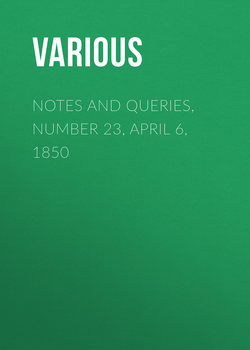Читать книгу Notes and Queries, Number 23, April 6, 1850 - Various - Страница 2
NOTES
POPE VINDICATED
Оглавление"P.C.S.S." is too great an admirer of Pope not to seek to vindicate him from one, at least, of the blunders attributed to him by Mr. D. Stevens, at p. 331. of the "Notes and Queries."
"Singed are his brows, the scorching lids grow black."
Now, if Mr. S. will refer to Homer, he will find that the original fully justifies the use of "brows" and "lids" in the plural. It runs thus (Od. ix. v. 389.):
"Παντα δε υι βλεφαρ αμφι και οφρυασ ευσεν αυτμη."
"P.C.S.S." wishes that he could equally remove from Pope the charge of inaccuracy respecting the three cannibal meals of Polyphemus. He fears that nothing can be alleged to impugn Mr. Stevens's perfectly just criticism.
While on the subject of Pope, "P.C.S.S." would wish to advert to a communication (No. 16. p. 246.) in which it is insinuated that Pope was probably indebted to Petronius Arbiter for the well-known passage—
"Worth makes the man, and want of it the fellow;
The rest is all but leather and prunella."
With all respect for the ingenious author of that communication, "P.C.S.S." confesses that he is unable to discover such a similitude of expression as might warrant the notion that Pope had been a borrower from Petronius. He cannot suppose that Mr. F. could have been led away by any supposed analogy between corium and coricillum. The latter, Mr. F. must know, is nothing more than a diminutive of a diminutive (coricillum, not corcillum, from corculum); and the word is coined by Petronius to ridicule one of the affectations of Trimalchio (Nero), who was wont to indulge, to an absurd extent, in the use of such diminutives (vide Burmann, in loco). "P.C.S.S." will now subjoin such translations of the passage in question as he has hitherto had opportunities of referring to. The first is from The Works of Petronius Arbiter, translated by several hands, Lond. 8vo. 4th edit. 1714. At the beginning of the translation itself there is this heading—"Made English by Mr. Wilson, of the Middle Temple, and several others." The passage in question is thus rendered:—
"Come, my friends, let us see how merry you can be! for in my time, I have been no better than yourselves; but, by my own industry, I am what I am. 'Tis the heart makes the man; all the rest is but stuff!"
In another translation, which, with Grub-Street audacity, the publisher, in his title-passage, presumes to attribute to Addison! and which appeared in 1736 (Lond. 8vo.), the passage is as follows:—
"I was once as you are: but now, thanks to my industry, I am what I am. It is the heart that makes the man; all the rest is but stuff!"
Be the translator who he may, this version, so impudently ascribed to the moral Addison, is written with much spirit and power, and with a remarkable comprehension of the author's meaning. Some of the poetical fragments at the end are, indeed, singularly well done.
Of the two French versions which "P.C.S.S." has examined, the one by Levaur (Paris, 8vo. 1726) thus translates the passage:
"Je vous prie, mes amis … C'est le coeur qui fait les hommes; je compte le reste pour un fétu."
In that of Boispreaux (Lond. 1742), it is simply rendered—
"Mon sçavoir faire m'a tiré du pair. C'est le coeur qui fait l'homme …"
No attempt is made to translate the quisquilia.
P.C.S.S.
